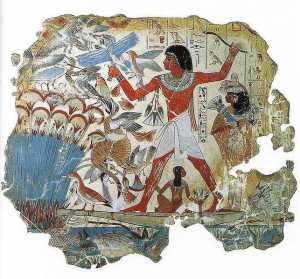Pagan Paths
Out of the deeps rises the mysterious lotus. Stop in for refreshment, heka, and reflections from the sacred waters of ancient Egypt.
Giving Thanks For The Egyptians
 Unlike the meme of the “wandering Jew,” people dispersed by the Roman destruction of the temple and city of Jerusalem in 70 ce, the Egyptians always defined themselves as belonging to the land of the Nile and do not seem to have retained any cultural identity after being conquered first by the Persians, then the Greeks, then the Romans. The last temple of Isis closed in the fourth century ce and with it the knowledge of the medu netjer, the sacred words that we call hieroglyphs.
Unlike the meme of the “wandering Jew,” people dispersed by the Roman destruction of the temple and city of Jerusalem in 70 ce, the Egyptians always defined themselves as belonging to the land of the Nile and do not seem to have retained any cultural identity after being conquered first by the Persians, then the Greeks, then the Romans. The last temple of Isis closed in the fourth century ce and with it the knowledge of the medu netjer, the sacred words that we call hieroglyphs.
Recently, I watched a documentary on chaplains in which a rabbi chaplain lovingly carries a beautiful Torah, buckles a seat belt around it in his car, and uses it in a service at a nursing home. It made me remember my visit earlier this year to a Shabbos service at one of the synagogues here in Columbia (Beth Shalom). I was very warmed that evening to see how the people loved their Torah, loved getting a chance to read aloud from it to the congregation, and greeted one another as it was paraded around the sanctuary with song.
 I wondered why it is that I love my sacred words so much. After all, a great deal of the writings the Egyptians left us are not religious or inspirational texts (though many are). Even the Wisdom of Ptah-hotep, while very wise and useful, is clearly about how to be successful as a member of the aristocracy as much as they are about ethical living. So why do the medu netjer give me comfort? Why do I love to study Middle Egyptian?
I wondered why it is that I love my sacred words so much. After all, a great deal of the writings the Egyptians left us are not religious or inspirational texts (though many are). Even the Wisdom of Ptah-hotep, while very wise and useful, is clearly about how to be successful as a member of the aristocracy as much as they are about ethical living. So why do the medu netjer give me comfort? Why do I love to study Middle Egyptian?
As soon as I pondered the question, the answer leapt out at me in the colorful, passionate voices of the people who wrote down what they felt was most important. Whether I am reading a fairy tale about a goose which comes back to life after being beheaded, or the grand epic journey of the sun through the Duat, I am always engaged by the spirits of these individuals who lived so long ago that for centuries they were even forgotten by their own descendants.
So it is this Thanksgiving that I am grateful for the ancestors, our ancestors by birth, but also our spiritual ancestors, our cultural ancestors, and all those whose lives still shine brightly down the years, despite the passage of time. The Egyptians did a good job of reminding us through their epitaphs and tomb stories just what is most important: we feed the hungry, we ferry the boatless, we work hard, play hard, and maintain maat, balance and justice.
Comments
-
Please login first in order for you to submit comments



















